- Koirala, B., Rushton, S., Adhikary, P., Balen, J., et al. (2024) COVID-19 as a challenge to Nepal’s newly federalised health system: capacities, responsibilities, and mindsets, Asia Pacific Journal of Public Health (online first) https://doi.org/10.1177/1010539524125012.
- Sapkota, S., Rushton, S., van Teijlingen, E., et al. (2024) Participatory policy analysis in health policy and systems research: reflections from a study in Nepal. Health Research & Policy Systems, 22 (No.7) https://doi.org/10.1186/s12961-023-01092-5 .
- Wasti, S.P., van Teijlingen, E., Simkhada, P., et al. (2023) Selection of Study Sites and Participants for Research into Nepal’s Federal Health System, WHO South-East Asia Journal of Public Health 12(2):116-119.
- Sapkota, S., Dhakal, A., Rushton S., et al. (2023) The impact of decentralisation on health systems: a systematic review of reviews. BMJ Global Health 8:e013317. doi:10.1136/bmjgh-2023-013317.
- Wasti, S.P., van Teijlingen, E., Rushton, S., et al. (2023) Overcoming the Challenges Facing Nepal’s Health System During Federalisation: An Analysis of Health System Building Blocks, Health Research Policy & Systems 21(117) https://doi.org/10.1186/s12961-023-01033-2
- Sapkota, S., Panday, S., Wasti, S.P., et al. (2022) Health System Strengthening: The Role of Public Health in Federal Nepal, Journal of the Nepal Public Health Association 7(1):36-42.
- Adhikary, P., Balen, J., Gautam, S., et al. (2020) The COVID-19 pandemic in Nepal: Emerging evidence on the effectiveness of action by, and cooperation between, different levels of government in a federal system, Journal of Karnali Academy of Health Sciences 3 (3): 1-11.
- Rushton, S., Pandey, S., van Teijlingen, E., et al. (2021) An Investigation into the Impact of Decentralization on the Health System of Nepal. Journal of Manmohan Memorial Institute of Health Sciences, 7(1): 3–14. https://doi.org/10.3126/jmmihs.v7i1.43146
Category / Research communication
Meeting at BU to address maternal inequalities
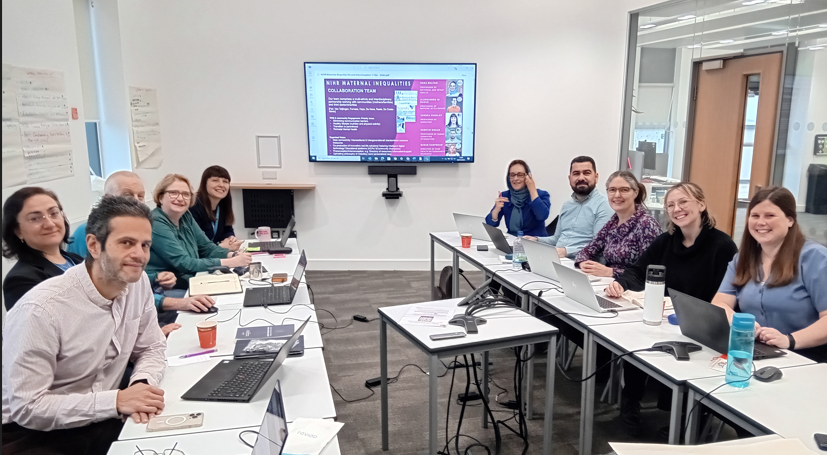 Today and yesterday (January 7-8) academics involved in MIHERC (Maternal and Infant Health Equity Research Centre), the successful interdisciplinary collaboration to address challenges in maternity care, met in Bournemouth. MIHERC is led by Sheffield Hallam University, along with Bournemouth University, South Yorkshire Digital Health Hub (SYDHH) and the Health Determinant Research Collaboration, Doncaster. In addition, a range of local and national partners are recognised. MIHERC is one of the nine groups of UK universities making up the new NIHR Challenge Maternity Disparities Consortium. This NIHR Consortium aims of tackling inequalities in maternity outcomes, focusing on inequalities before, during and after pregnancy.
Today and yesterday (January 7-8) academics involved in MIHERC (Maternal and Infant Health Equity Research Centre), the successful interdisciplinary collaboration to address challenges in maternity care, met in Bournemouth. MIHERC is led by Sheffield Hallam University, along with Bournemouth University, South Yorkshire Digital Health Hub (SYDHH) and the Health Determinant Research Collaboration, Doncaster. In addition, a range of local and national partners are recognised. MIHERC is one of the nine groups of UK universities making up the new NIHR Challenge Maternity Disparities Consortium. This NIHR Consortium aims of tackling inequalities in maternity outcomes, focusing on inequalities before, during and after pregnancy.
 Our second planning meeting highlighted our collective strengths including our expertise in community engagement and PPIE (Public & Patient Involvement & Engagement); intelligent digital solutions in maternity service delivery; research into under-served communities; and capacity building of both communities and maternity staff. The first planning meeting was held late last year at Sheffield Hallam University.
Our second planning meeting highlighted our collective strengths including our expertise in community engagement and PPIE (Public & Patient Involvement & Engagement); intelligent digital solutions in maternity service delivery; research into under-served communities; and capacity building of both communities and maternity staff. The first planning meeting was held late last year at Sheffield Hallam University.
MIHERC is the only midwifery-led collaboration with a strong community engagement and digital inclusive research. MIHERC will work with various NHS Trusts as well as charities such as the Active Pregnancy Foundation, Active Dorset, and Maternal Mental Health Alliance.
New editorial Journal of Asian Midwives
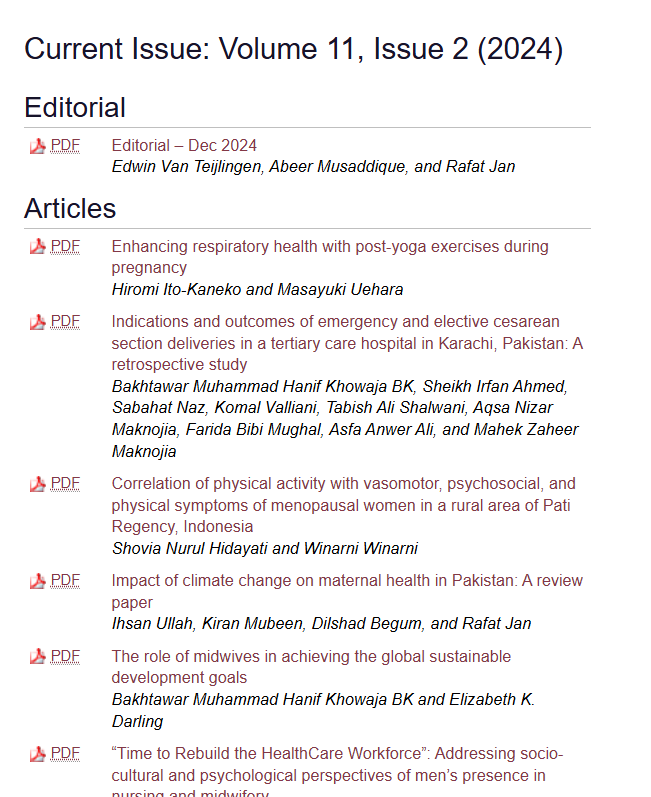 This weekend a new issue of the Journal of Asian Midwives appeared online [1]. Its latest editorial focuses in part on research ethics. The editors highlight the new World Health Organization (WHO) guidance for best practices in clinical trials [2]. The new WHO guidance was picked up at the 24th FERCAP International Conference “Maximizing Benefits through Responsible Conduct of Research” held in November 2024 in Nepal. FERCAP is the Forum for Ethical Review Committees in the Asian and Western Pacific Region.
This weekend a new issue of the Journal of Asian Midwives appeared online [1]. Its latest editorial focuses in part on research ethics. The editors highlight the new World Health Organization (WHO) guidance for best practices in clinical trials [2]. The new WHO guidance was picked up at the 24th FERCAP International Conference “Maximizing Benefits through Responsible Conduct of Research” held in November 2024 in Nepal. FERCAP is the Forum for Ethical Review Committees in the Asian and Western Pacific Region.
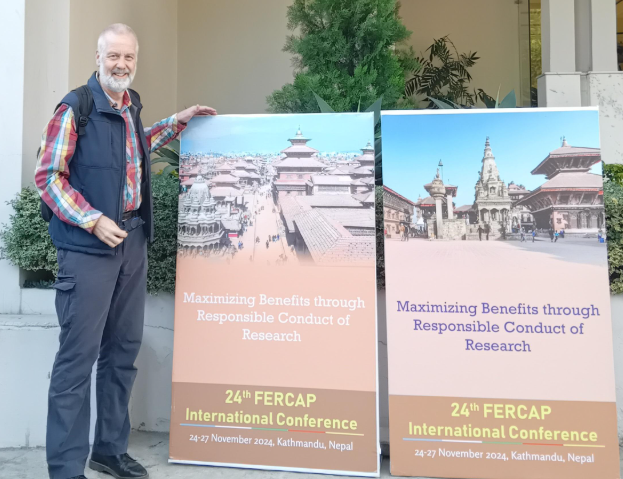 FERCAP reminded us that research as a social activity should improve health and quality of life for both targeted and general populations. One notable message from this recent conference was the need for shorter and more comprehensible consent forms to make them user-friendly without sacrificing clarity. The other interesting development is that of so-called “decentralized clinical trials”. Decentralized or point-of-care trials can increase the diversity of clinical trial enrollment by increasing its accessibility, for example where elements of the trial are delivered at home and/or data are collected electronically by trial participants instead of researchers. These are exciting new developments in thinking about research ethics.
FERCAP reminded us that research as a social activity should improve health and quality of life for both targeted and general populations. One notable message from this recent conference was the need for shorter and more comprehensible consent forms to make them user-friendly without sacrificing clarity. The other interesting development is that of so-called “decentralized clinical trials”. Decentralized or point-of-care trials can increase the diversity of clinical trial enrollment by increasing its accessibility, for example where elements of the trial are delivered at home and/or data are collected electronically by trial participants instead of researchers. These are exciting new developments in thinking about research ethics.
The Journal of Asian Midwives is Gold Open Access and hence freely available online.
Prof. Edwin van Teijlingen
Centre for Midwifery & Women’s Health
References:
- van Teijlingen, E., Musaddique, A., Jan, R. (2024) Editorial – Dec 2024. Journal of Asian Midwives, 11(2):1–2.
- World Health Organization (2024). Guidance for best practices for clinical trials. World Health Organization. https://www.who.int/publications/i/item/9789240097711 (accessed Jan. 2025)
Dr. Catalin Brylla Leads Diversity and Inclusion Programme for Visible Evidence
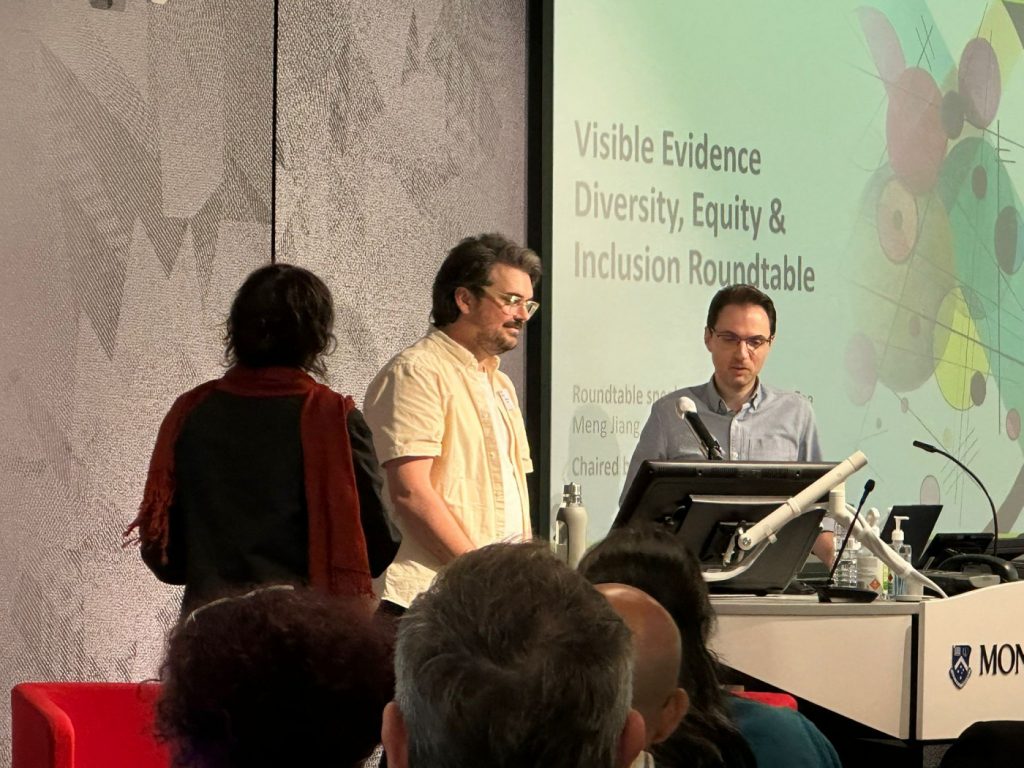
Dr. Catalin Brylla, Principal Lecturer in Film and TV (FMC) has been appointed Chair of the Visible Evidence Diversity, Equity and Inclusion Advisory Committee. The committee’s programme was launched at the 2025 Visible Evidence Conference at Monash University in Melbourne.
Visible Evidence (VE) is the largest and oldest documentary studies community, having produced a wealth of research by renowned scholars, such as Bill Nichols, Michael Renov, Brian Winston, Patricia Zimmerman and Kate Nash. It has a long history of interdisciplinary and transdisciplinary research, fostering links between the academy and the media industry, and fusing documentary research, practice and education.
The VE DEI Advisory Committee has been established by the VE Governing Council to diversify its members and expand its outreach. The committee consists of Catalin Brylla as chair, Slava Greenberg, Tory Jeffay, Patrick Kelly and Geoffrey Lokke. Brylla has drawn up a plan to reach early-career researchers, Global South scholars/practitioners and other underrepresented academic and non-academic communities. He draws on his experience as Chair of the Society for Cognitive Studies of the Moving Image DEI Committee, founding member of the Journal of Media Practice’s Diversifying and Decentralizing Research Working Group, and Deputy Director of BU’s Centre for the Study of Conflict, Emotion and Social Justice.
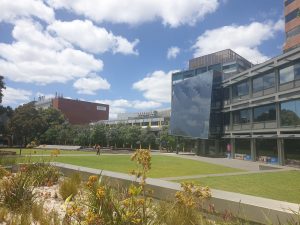
The committee’s programme was launched at the 30th Visible Evidence Conference at Monash University, Melbourne, in December 2025. It featured a roundtable with scholars and media practitioners Dr. Shweta Kishore, Dr. Zoe Meng Jiang, Prof. Kate Nash and Prof. Pratāp Rughani, who provided their perspective of diversity and inclusion. The conference also featured the committee’s new mentorship initiative, which pairs up early-career members—including graduate students, junior faculty members and emerging filmmakers—with mid-career and senior scholars or media professionals.
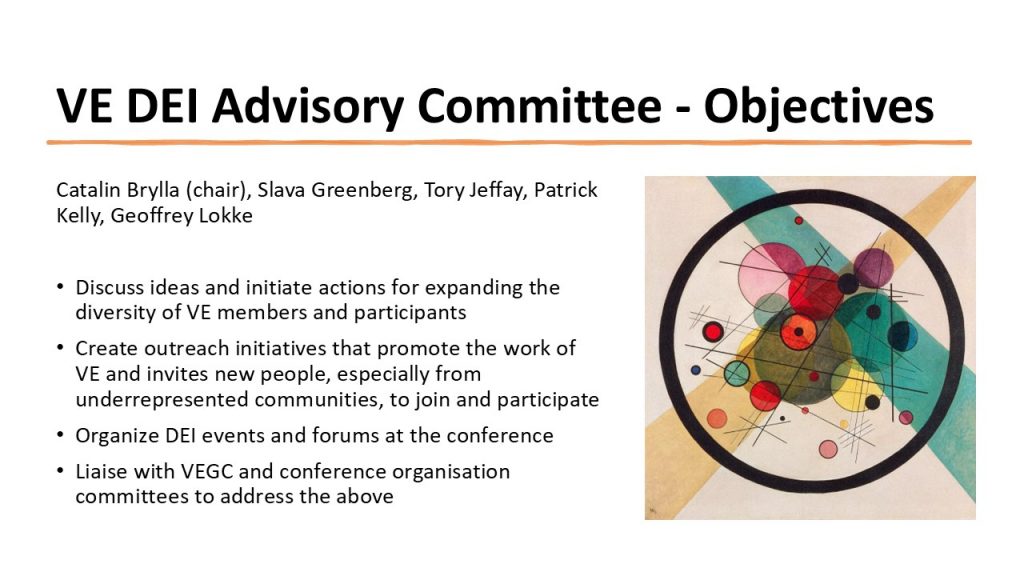
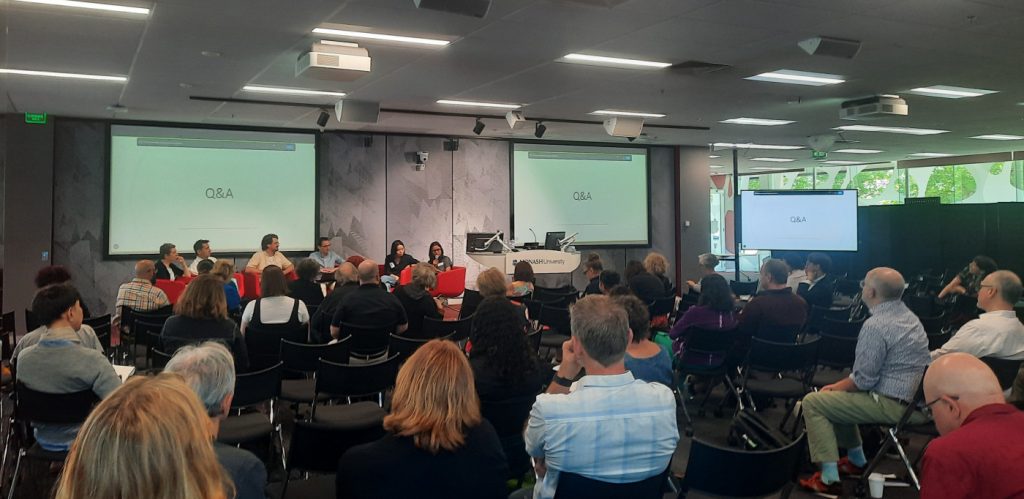
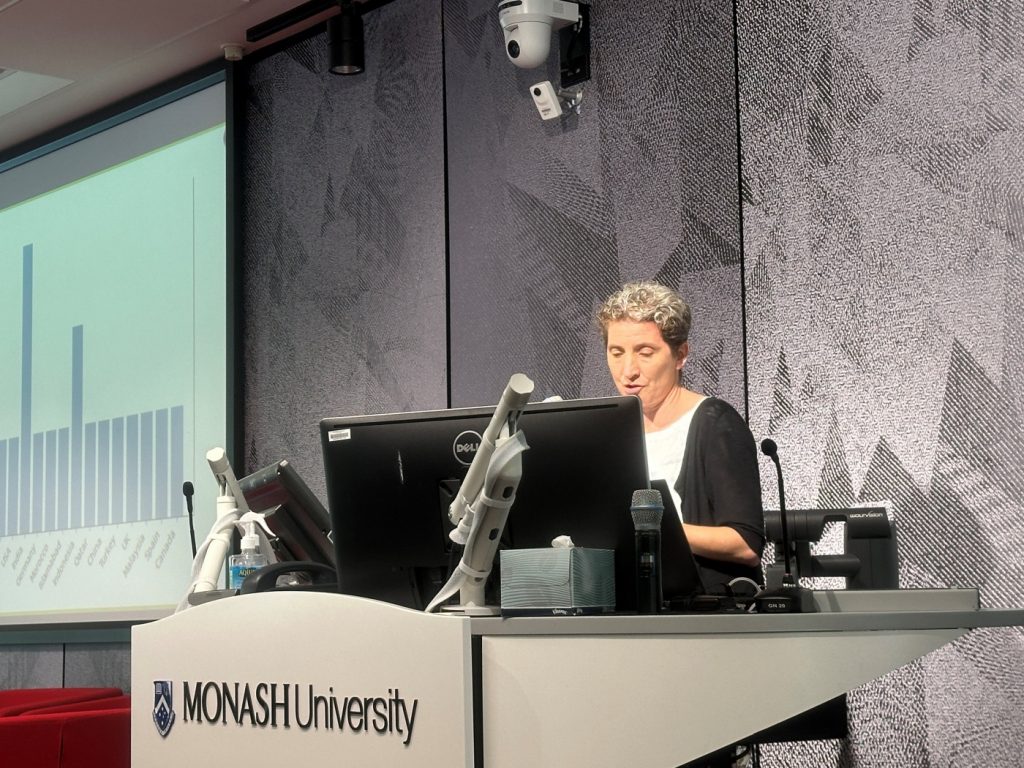
Image above: Prof. Kate Nash presents data on institutional affiliations of first authors submitting to the journal Studies in Documentary Film; there is a distinct lack of submission from Global South scholars.
Some of the committee’s action plans include:
- Organising a DEI-related roundtable and workshop at every VE conference, featuring scholars from the Global South
- Organise career development ‘clinics’ for early-career researchers
- Create a VE YouTube channel that features recorded conference presentations for people who cannot attend the conference
- Liaise with journal editors to commission special issues from Global South scholars
- Monitoring VE membership and conference participation regarding institutional affiliations and countries
The VE DEI Committee’s programme was launched at Monash University Melbourne, on the unceded lands of the Bunurong Boon Wurrung and Wurundjeri Woi Wurrung peoples of the Eastern Kulin Nation. We pay our deepest respect to the traditional owners of this land and acknowledge their ongoing relationship with the lands and waterways. We pay our respect to all Indigenous people, and their elders past and present.
The Year in Research 2024
2024 has been another great year for research and knowledge exchange at BU. From securing funding to disseminating findings, there’s a lot to celebrate.

The Month in Research
Here are just a few highlights from across the past year…
Your achievements
Thank you to everyone who has used the Month in Research online form to put forward their achievements, or those of colleagues, this year.
- With BU ECRN Research networking funding, Dr Sarah Hambidge (Faculty of Science and Technology) set up and hosted Unveiling the Digital Trail: A Tabletop Discussion on Cyber Signatures in Human Trafficking. The event was attended by The Home Office, The National Crime Agency, The College of Policing, Chief of Staff to the Anti-Slavery Commissioner, NGOs, a number of UK police forces, and academics. The event was supported by Dr Terri Cole and Dr Kari Davies and co-hosted with the National Police Chiefs’ Council. Read more about the event.
- PhD student Damla Kuleli (Faculty of Science and Technology; the MINE lab) attended and gave an oral presentation at the 24th ACM International Conference on Intelligent Virtual Agents in Glasgow, receiving very valuable feedback from the experts and the opportunity to explore and enhance knowledge on embodied and conversational agents. Damla also had their first paper published from their PhD as an extended abstract titled “Exploring Influence of Social Anxiety on Embodied Face Perception during Affective Social Interactions in VR” in the ACM Digital Library, co-authored with supervisors Dr Xun He, Dr Nicola Gregory, Liucheng Guo, Professor Fred Charles, Dr Laura Renshaw-Vuillier, and Chang Hong Liu. The study investigates the early face perception of socially anxious individuals using EEG during social interactions with virtual agents in a VR setting.
- Professor Amanda Korstjens and Anastasia Vayona (Faculty of Science and Technology) gave a public webinar for the BCS, The Chartered Institute for IT, on their public engagement project AWE (Augmented Wildlife Experiences), which combines nature and technology to create educational wildlife trails. A recording of the presentation, titled Augmented Wildlife Experiences: AWE trails to support nature connection, can be viewed on the BCS website.
In addition:
- Research led by Professor Matthew Bennett and Dr Sally Reynolds (Faculty of Science and Technology) at White Sands National Park in New Mexico won the Research Project of the Year: Arts, Humanities and Social Sciences award at this year’s Times Higher Education Awards. The project has rewritten understanding of when humans settled in America. Read more here.
- Professor Vanora Hundley (Faculty of Health and Social Sciences) and Professor Kate Welham (Faculty of Science and Technology) have been appointed to sit on the REF People, Culture and Environment (PCE) pilot panels, exploring the practicalities of the submission and assessment to inform the REF 2029 guidance on PCE. Read more here.
- Dr Theo Akudjedu (Faculty of Health and Social Sciences) was awarded the European Federation of Radiographer Societies award, in recognition of his research achievements in the field of radiography. Read more here.
Funding
Congratulations to all those who have had funding for research and knowledge exchange projects and activities awarded in 2024. Across the year, BU received funding for 116 projects, totalling over £7 million.
Highlights include:
- c.£170,000 in funding from the Arts and Humanities Research Council (AHRC) to investigate the creative and legal issues around the use of artificial intelligence in media production (Project lead: Dr Szilvia Ruszev, Faculty of Media and Communication) Read more here.
- c.£1.4m from the National Institute for Health and Care Research (NIHR) to work in partnership with the University of the West of England to deliver the INSIGHT programme for South West Central region, proving research training for health and students and early career professionals. (BU Project lead: Professor Carol Clark, Faculty of Health and Social Sciences). Read more here.
- c.£77,000 from Cancer Research UK to improve early detection of skin cancer, particularly among under-represented and high-risk groups. (Project lead: Professor Steven Ersser, Faculty of Health and Social Sciences) Read more here.
- c.£220,000 from Innovate UK for a Knowledge Transfer Partnership with Wimborne-based image sharing site ClickASnap to develop a bespoke AI content moderation system for their platform. (Project lead: Dr Simant Prakoonwit, Faculty of Science and Technology) Read more here.
- c.£2.78m from the National Institute for Health and Care Research (NIHR) to work in partnership with the University of Plymouth to investigate the effectiveness of oral nutritional supplements for malnourished older adults in care home. (BU Project lead: Professor Jane Murphy, Faculty of Health and Social Sciences) Read more here.
Publications
Congratulations to all those who have had work published across the last year.
In total, 1,214 items were added to the BURO online repository in 2024, with over 850,000 downloads throughout the year.
BU was also ranked 13th out of over 1,500 major universities for the proportion of open access research outputs in the CWTS Leiden Ranking 2024. Read more here.
Content for The Year in Research has been collected using the research and knowledge exchange database (RED), the Bournemouth University Research Online (BURO) repository and submissions via The Month in Research online form, as well as news stories published throughout the year. It is by no means intended to be an exhaustive list. All information is correct as of 19.12.24.
BU Professors appointed to REF People, Culture and Environment (PCE) pilot panels
Professor Kate Welham and Professor Vanora Hundley have been appointed as members of the Research Excellence Framework (REF) People, Culture and Environment (PCE) pilot panels.
The next REF exercise, due to take place in 2029, will deliver an expanded definition of research excellence – recognising the wide range of research, roles, and people that are essential to the UK’s research system.
A key part of this is the development of the PCE element – assessing the research culture and environment of institutions and how research and researchers are supported.
The PCE pilot panels will explore the practicality of submission and assessment of the various elements of PCE.
Professor of Midwifery Vanora Hundley, who will sit on the UoA 3 (Allied Health Professions, Dentistry, Nursing and Pharmacy) panel, said: “People, the research culture and the environment in which researchers work are vital to supporting excellent research.
“I am delighted that REF have made People, Culture and Environment (PCE) a focus for REF2029 and I look forward to working with the panel to develop robust processes to support the PCE element.”
Professor of Archaeological Sciences Kate Welham, who will sit on the pilot panel for UoA11 (Computer Science and Informatics) said: “This is a fantastic opportunity to contribute to the development of fair and transparent approaches that recognise how quality research is created across the UK. I am really looking forward to working with everyone taking part in the exercise.”
The experience and feedback of the panels will be included in the final pilot report, which will inform the REF 2029 guidance on PCE.
To find out more about the PCE pilot and REF 2029, please visit the REF website
BU academics interviewed for major Greek newspaper on their research on political campaigning and populism
In light of the widespread use of populism by politicians across the world, BU academics Anastasia Veneti and Savvas Voutyras were interviewed by the Greek newspaper I Epohi on their research on political campaigning and populism.
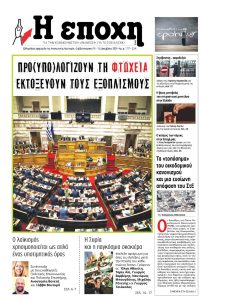 In the interview, the researchers explained that there is no single definition of populism. However, there is general consensus that populism comprises a view of politics as a fundamental antagonism between ‘the people’ and ‘the elites’, favouring the interests of the people.
In the interview, the researchers explained that there is no single definition of populism. However, there is general consensus that populism comprises a view of politics as a fundamental antagonism between ‘the people’ and ‘the elites’, favouring the interests of the people.
Dr Voutyras argued that, in practice, it is anti-populists who define opponents as populists, regardless of whether they fit any definition. This initially seems to have some strategic advantages, since it categorises opponents as a singular problem and, in this sense, rallies supporters. In the long run, however, this tactic has facilitated the growth of the radical right. Parties that used to be labelled as neo-fascist, racist or authoritarian, have acquired new a label (i.e., ‘populist’) that is easier to manage.
Dr Veneti explained that there is a strand of studies that approach populism as a communication style. In such cases, the main dimensions of populist political actors’ communication are (a) people-centrism, (b) anti-elitism, (c) and reference to outgroups, and we can see these dimensions built in the political message both discursively and visually.
The whole interview can be found here.
RKEDF: ECRN – Work/Life balance for ECRs and PGRs

This in-person session on Wednesday 12 February 2025, 1pm to 2pm, is aimed at Academics, Researchers and PGRs with an interest in discussing work/life balance within Academic roles and careers.
The session aims to discuss approaches to setting and maintaining healthy work/life balance whilst also managing the demands of their role. It will follow an open, discursive model and invite responses from ECRs with input from the Academic leads.
By the end of the session, attendees will have acquired knowledge of models and techniques to healthy professional practice with regards to time management, wellbeing and working practices, and have had the opportunity to discuss their specific circumstances with peers and experienced Academic mentors.
For further information on this event please contact RKEDF@bournemouth.ac.uk
RKE Pre-Award support over the festive period
The festive break is fast approaching and with that, there will be reduced staffing across the University. To ensure we can maintain comprehensive pre-award support and to help with forward planning, 29th November will be the latest date an ITB can be submitted for any bid with a deadline before 8th January.
For bids due before 8th January for which an ITB is received after 29th November, a Facilitator will work with you to find a suitable alternative call.
In some cases BU’s Fast Track route may be an option. Please check if your activity meets the Fast Track requirements and if it does, you are encouraged to use it.
Evaluating complex interventions
There are several different methods or approaches to help researchers when evaluating of complex public health interventions or programmes. Our recent paper ‘Most Significant Change Approach: A Guide to Assess the Programmatic Effects’ [1] describes the Most Significant Change (MSC) participatory technique to monitor and evaluate programmatic effects. The MSC is a form of monitoring because it occurs throughout the programme’s lifecycle and provides information to manage it. Unfortunately, MSC as a participatory evaluation technique using qualitative methods is not widely used nor known. 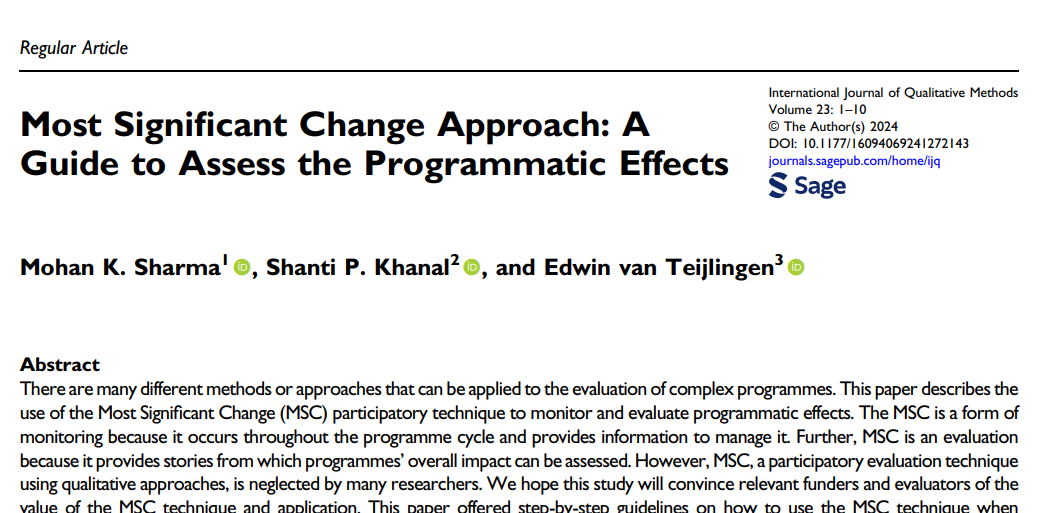
We hope to convince relevant funders and evaluators of the value of the MSC technique and application. Our paper offers step-by-step guidelines on how to use the MSC technique when evaluating a large-scale intervention covering perspectives of different beneficiaries within a limited period. The MSC process involves purposively selecting the beneficiaries, collecting the Most Significant (MS) stories, which are then systematically analysed by designated stakeholders and or implemented partners, selected through internal vetting, and external process by involving beneficiaries and stakeholders.
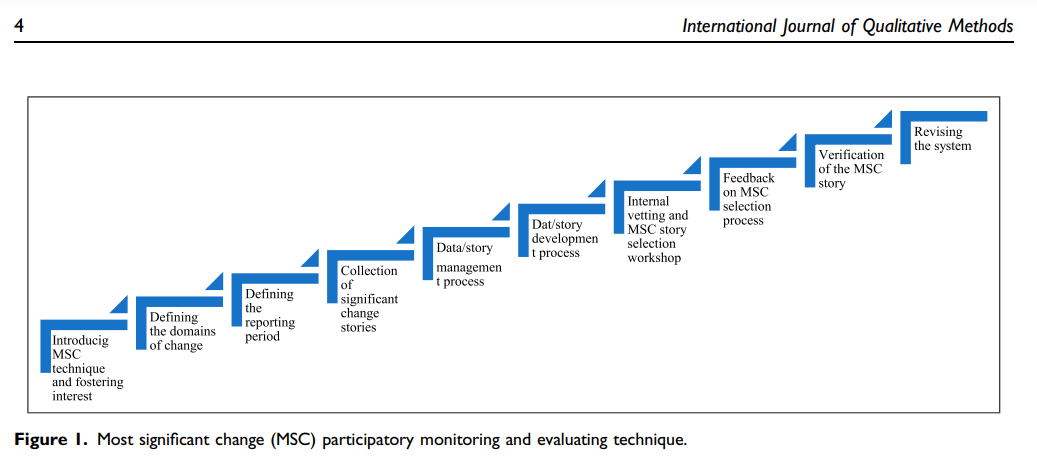 The central question focuses on changes in the form of stories such as ‘Who did what?’; ‘When did the change occur?’; and ‘What was the process?’ Additionally, it seeks feedback to explain why particular a story was selected as MS and how the selection process was organised. The MSC technique further attempts to verify the validity, significant, relevant, sustainability of the change, and impact on marginalized or Gender Equality and Social Inclusion (GESI) groups brought by the programme. Furthermore, the technique seeks verification of the MS story by triangulating comprehensive notes and recordings.
The central question focuses on changes in the form of stories such as ‘Who did what?’; ‘When did the change occur?’; and ‘What was the process?’ Additionally, it seeks feedback to explain why particular a story was selected as MS and how the selection process was organised. The MSC technique further attempts to verify the validity, significant, relevant, sustainability of the change, and impact on marginalized or Gender Equality and Social Inclusion (GESI) groups brought by the programme. Furthermore, the technique seeks verification of the MS story by triangulating comprehensive notes and recordings.
Prof. Edwin van Teijlingen
Centre for Midwifery & Women’s Health

Reference:
- Sharma, M. K., Khanal, S. P., & van Teijlingen, E. (2024). Most Significant Change Approach: A Guide to Assess the Programmatic Effects. International Journal of Qualitative Methods, 23. https://doi.org/10.1177/16094069241272143
New midwifery publication
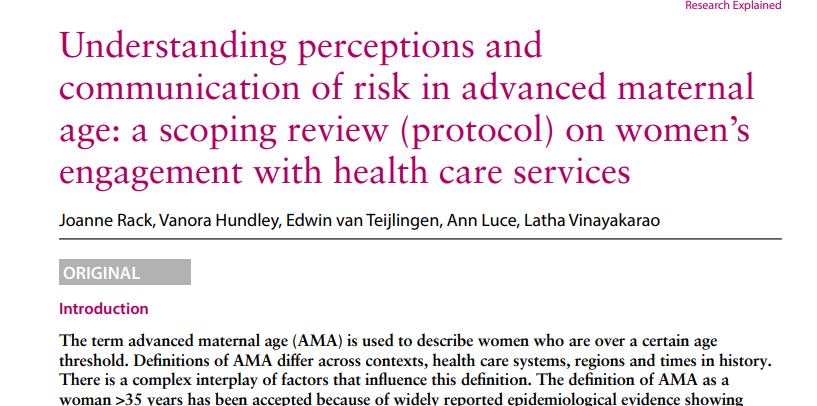 Congratulations to Ph.D. student Joanne Rack on the publication today of her paper ‘Understanding perceptions and communication of risk in advanced maternal age: a scoping review (protocol) on women’s engagement with health care services’ [1]. Joanne is currently doing a Clinical Doctorate in the Centre for Midwifery & Women’s Health (CMWH) focusing on personalised care for women of advanced maternal age. Her doctoral study is matched-funded by University Hospitals Dorset NHS Foundation Trust and Bournemouth University [BU].
Congratulations to Ph.D. student Joanne Rack on the publication today of her paper ‘Understanding perceptions and communication of risk in advanced maternal age: a scoping review (protocol) on women’s engagement with health care services’ [1]. Joanne is currently doing a Clinical Doctorate in the Centre for Midwifery & Women’s Health (CMWH) focusing on personalised care for women of advanced maternal age. Her doctoral study is matched-funded by University Hospitals Dorset NHS Foundation Trust and Bournemouth University [BU].  Her PhD is supervised and supported by Profs. Vanora Hundley, Ann Luce and Edwin van Teijlingen at BU and Dr. Latha Vinayakarao in Poole Maternity Hospital.
Her PhD is supervised and supported by Profs. Vanora Hundley, Ann Luce and Edwin van Teijlingen at BU and Dr. Latha Vinayakarao in Poole Maternity Hospital.
Well done!
Reference:
- Rack, J., Hundley, V., van Teijlingen, E., Luce, A., Vinayakarao. L. (2024) Understanding perceptions and communication of risk in advanced maternal age: a scoping review (protocol) on women’s engagement with health care services, MIDIRS Midwifery Digest, 34(3): 201-204.
FHSS academics’ paper cited 1,000 times
This morning ResearchGate alerted us that our paper published two decades ago ‘The Importance of Pilot Studies’ has now been cited one thousand times [1]. This methods paper in the Nursing Standard is very often used by authors quoting a paper in their research methods section when they have done pilot or feasibility study for a larger-scale study. This paper is also our second top cited paper with 1,982 citations on Google Scholar and, interestingly enough, on SCOPUS it is not listed at all.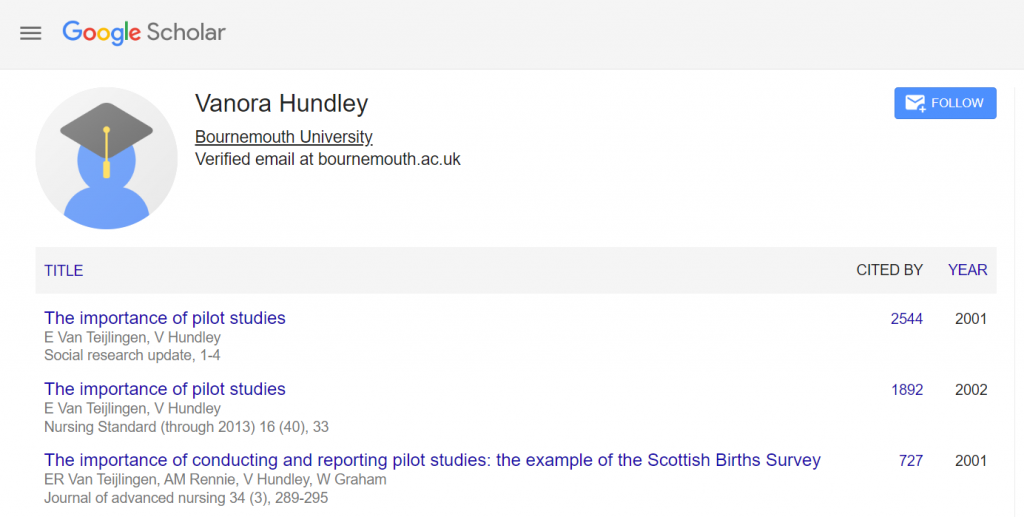
Pilot studies are a crucial element of a good study design. Conducting a pilot study does not guarantee success in the main study, but it does increase the likelihood of success. Pilot studies fulfill a range of important functions and can provide valuable insights for other researchers. There is a need for more discussion among researchers of both the process and outcomes of pilot studies. 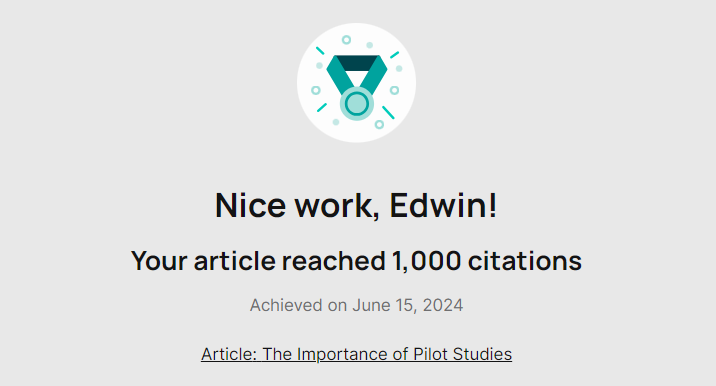
This paper is one of several methods paper focusing on pilot studies we have published over the past 22 years [2-7].
Professors Vanora Hundley & Edwin van Teijlingen
Centre for Midwifery & Women’s Health
References:
- van Teijlingen E, Hundley, V. (2002) ‘The importance of pilot studies’ Nursing Standard 16(40): 33-36. Web: nursing-standard.co.uk/archives/vol16-40/pdfs/vol16w40p3336.pdf
- van Teijlingen E, Rennie, AM., Hundley, V, Graham, W. (2001) The importance of conducting & reporting pilot studies: example of Scottish Births Survey, Journal of Advanced Nursing, 34: 289-95.
- Simkhada, P, Bhatta, P., van Teijlingen E (2006) Importance of piloting questionnaire on sexual health research (Letter), Wilderness & Environmental Medical Journal, 17(4): 295-96. wemjournal.org/wmsonline/?request=get-document&issn=1080-6032&volume=017&issue=04&page=0295#Ref
- van Teijlingen E, Hundley, V. (2001) The importance of pilot studies, Social Research Update Issue 35, (Editor N. Gilbert), Guildford: University of Surrey. Web: http://www.soc.surrey.ac.uk/sru/SRU35.html
- Hundley, V., van Teijlingen E. (2002) The role of pilot studies in midwifery research RCM Midwives Journal 5(11): 372-74.
- van Teijlingen E, Hundley, V. (2005) Pilot studies in family planning & reproductive health care, Journal of Family Planning & Reproductive Health Care 31(3): 219-21.
- van Teijlingen E, Hundley, V. (2003) Pilot study, In: Encyclopaedia of Social Science Research Methods, Vol. 2, Lewis-Beck, M., Bryman, A. & Liao, T. (eds.), Orego, Sage: 823-24.
Which of us is human? Our experience being part of the ESRC Festival of Social Science
By Dr Maxine Gee and Dr Rachel Moseley
Back on a rainy November day in 2022, Drs Maxine Gee and Rachel Moseley transported members of the public into a future where robots and humans live and work together. The public met our future confederates and were posed the task of identifying which of the two was human and which was a robot. Our mission: to increase understanding and empathy for autistic people.
You might ask: What on earth do robots and the future have to do with autism? How can science-fiction have anything to say on this topic?
This event was held as part of the ESRC Festival of Social Science, an annual, UK-wide, free celebration of the social sciences to which BU has contributed for over ten years.
Our underlying research

Wall-E (Photo by Michael Marais on Unsplash)
The idea for the activity was based on shrewd observations by Dr Maxine Gee, Principal Academic in Screenwriting (Faculty of Media and Communications). Dr Gee studies how post-human characters (e.g. robots and other forms of artificial intelligence) are portrayed in media. What kind of qualities are written into these characters to signal to the audience that they’re not human? What qualities do screenwriters use to communicate that they’re not to be trusted, and what qualities make us root for them? You might think about Wall-E, whose expressive features and gestures make him highly lovable, or Data from Star Trek, whose attempts to understand and mimic the people around him endear him to the audience. Compare them with the Terminator or HAL, whose logic and unemotionality in pursuing their objectives inspire fear or distrust.
Dr Gee found that in science fiction screenwriters often distinguish human characters by expressions of emotion, and by the ability to tell stories so these characters can connect with others, express themselves and their identity, and also sometimes to lie or con their way out of situations. Moreover, characters in these films and television shows are perceived more positively when they express these characteristics.
These assumptions are based on a fundamental error: the idea that there is just one, ‘right’ way that humans express emotions and communicate. While each one of us is unique, most ‘neurotypical’ people have brains that work more similarly than dissimilarly to one another. People who are ‘neurodivergent’, though, have brains which function in more markedly different ways. This colours everything about the way they move through and experience the world, and gives rise to different ways of expressing emotions and communicating.
Autistic people are one such group, and this makes life very difficult for them. Being autistic is like having a mind which works on a different operating system, an apple mac in a world of Microsoft PCs. Because non-autistic people speak a slightly different social and emotional language, they can sometimes overlook or misunderstand autistic expressions of emotion, leading to stereotypes of autistic people as ‘wooden’ or, indeed, ‘robotic’.

Humanoid robot (Photo by Maximalfocus on Unsplash)
You might have heard of the Uncanny Valley effect in robotics – the more human-like a robot appears, the more unnerved people are by the slight deviations that shockingly reveal their artificiality. Research suggests that a similar process might be at work when autistic and non-autistic people interact, where differences in emotion and social behaviour can be unnerving for non-autistic people. From a very early age, non-autistic children distance themselves from autistic peers, while not necessarily being able or willing to consciously explain why. Autistic people are often socially excluded or bullied for their differences.
Dr Gee chatted to Dr Rachel Moseley, principal academic in Psychology, whose research focuses on mental health in autistic people. They noticed a parallel where many media portrayals of autistic people display traits which tend to mark out non-human characters in science-fiction – unemotionality, “cold” logic, rigidity in manner and movement. Since these features are often written to portray non-human characters less than sympathetically, we wondered whether there might be a link between these “less than human” portrayals of autistic people and the stigma they face.
Our public engagement activity
With the help of Bournemouth’s general public, we performed a field experiment. The public were told that one of our two colleagues from the future was a robot, and asked them a series of questions to try identify who was human. While we did have one robot and one human character, both were in fact carefully written to reflect different portrayals of autistic people. In the portrayal where autism stereotypes dovetail with robot characters, “Chris” (our robot) was logical and unemotional, without a lot of humour. In contrast, “Alex” was playful but diffident, constantly eager to please.
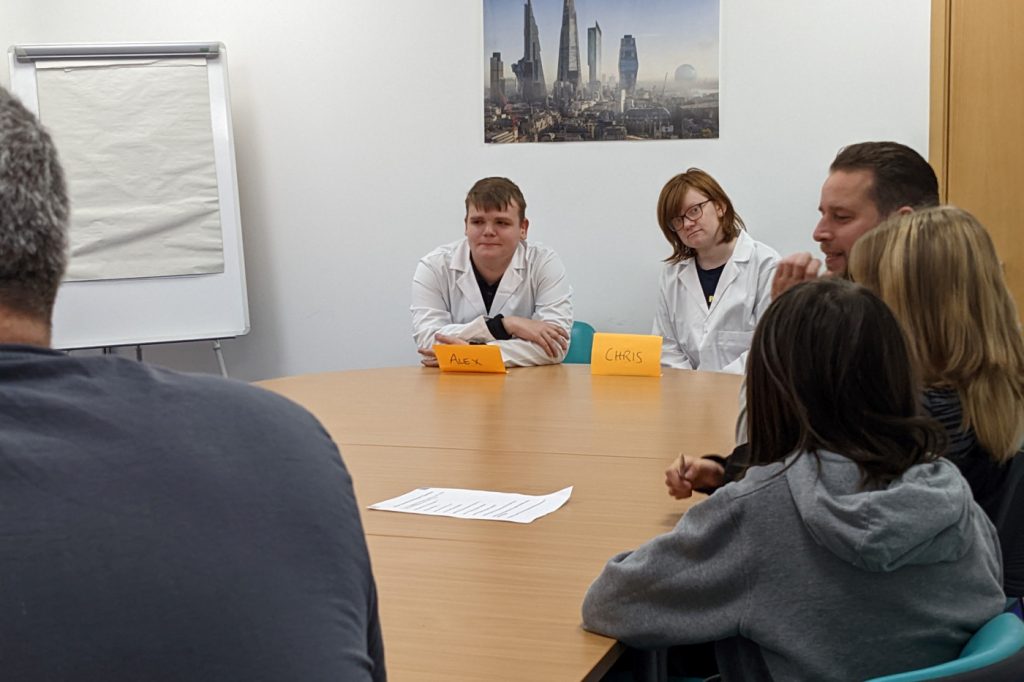
“Chris” and “Alex”, two of our actors.
They were based on autistic descriptions of camouflaging, which is when neurodivergent people consciously try to hide their differences and ‘act neurotypical’, from the way they make eye-contact, to copying their body language and speech mannerisms. Just like non-human characters are perceived more positively when they express emotions and social behaviours, autistic people are perceived more positively when they perform camouflaging behaviours, and it helps them avoid bullying or social exclusion. The problem is that camouflaging is exhausting, and it reinforces a sense of low self-worth. Autistic people who spend a lot of time camouflaging tend to have poorer mental health and also be more vulnerable to suicide.
We wondered whether the general public, who might be used to depictions of non-human characters, would be led to identify Chris (our stereotypical autistic portrayal) as the robot. Actually, we found that people were conflicted, with guesses balanced between the two characters. People noticed the Uncanny Valley aspect of Alex’s mannerisms, and knew there was something different about this character.
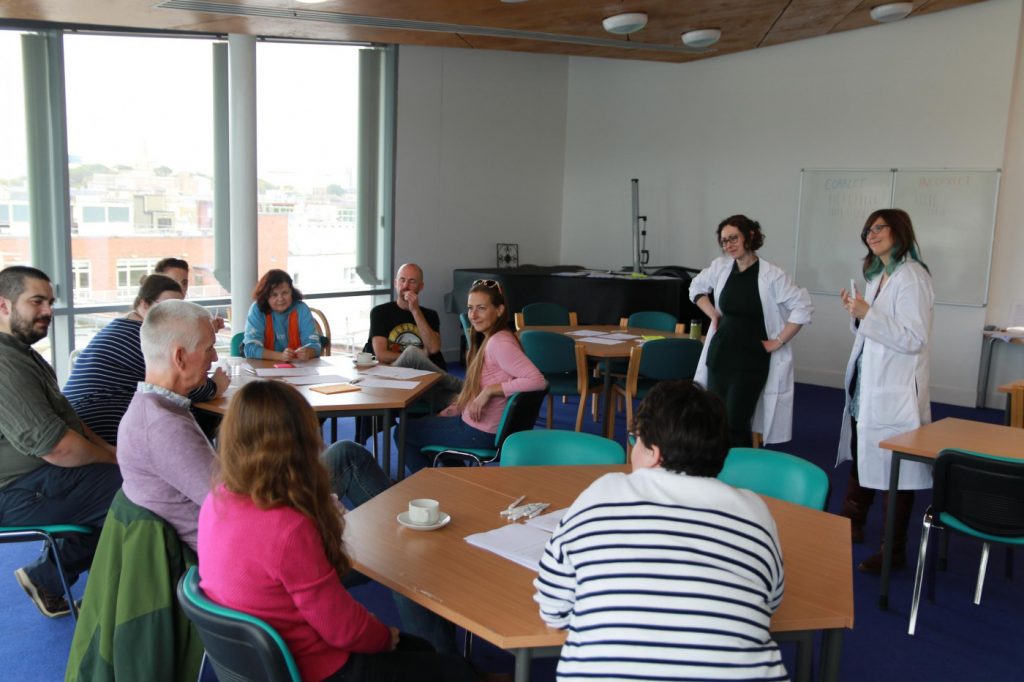
Max and Rachel in a discussion session with a group.
We explored their ideas about the traits they tended to associate with robot characters, and pointed out how these overlapped with representations of autism. In explaining how different types of brain give rise to different ways of socialising and communicating, we spoke about the painful efforts that autistic people go to hide their differences in order to be accepted. Concluding, we invited people to think about their assumptions of what it means to be human (and the inherent flip side of ‘not-human’), and the harm these assumptions could cause for people who don’t display those most common ways of behaving.
We measured the impact of this activity on attendees using surveys, the results of which might also feed into future research. Asked if the event increased their understanding of autism and empathy for autistic people, most of our respondents gave positive responses on the day. Those who responded two weeks later likewise gave mainly favourable responses, with one commenting “It was a very clever and accessible way to teach people about autism”, and others suggesting we should take the performance to schools. We especially valued one response by an autistic person in our audience: “I thought while watching that both could very easily be autistic and was scared that they might just say that being autistic was just like being a robot and that we had no feelings. Very happily surprised”
We ran the activity in thirty-minute slots throughout the day, welcoming over fifty attendees in total. Our immense gratitude goes to the Public Engagement team, our fantastic student actors, and our many colleagues who helped us during this event. We feel that the event was especially special in that it was co-produced, written and acted by an evenly split team of autistic and non-autistic people. One of our autistic actors had a fascinating and poignant insight into the double-bluff of playing a character who was camouflaging their autism just obviously enough for the audience to notice:
“Because I was so used to hiding it all … It was hard to not automatically revert back to covering it all up. Because the aim of being just an autistic person in real life is to try and not show your autism… So, it’s interesting to have to do that, force myself into that kind of corner in a way. … really seeing it and going, “Ah, but this isn’t what I usually do,” or “This is what I usually do,” or “Maybe I can do this in the future,” sort of thing. It almost made me feel slightly more comfortable taking in, kind of, showing a little bit more of me”
As we’re passionate about working towards a world where different ways of existing as a human are valued equally, we’re delighted with this feedback and look forward to taking our work further.
If you’re interested in engaging the public with your research, start by exploring what support is on offer at BU for research communications, impact and engagement. If you’d like to take part in this year’s ESRC Festival of Social Science, explore the other events that took place last year and look out for the call for proposals in March 2023.
Professor Melanie Klinkner receives European Research Council Consolidator Grant
A BU research project to develop a comprehensive human rights framework around mass graves has been awarded over £1.6 million from the European Research Council (ERC).
Mass Grave Protection, Investigation & Engagement: a comprehensive universal human rights framework – or MaGPIE – will be led by Professor Melanie Klinkner, Professor of International Law at BU.
There is also no universal framework for protecting and investigating mass graves to safeguard sites and human remains, as well as the rights and interests of survivors.
The MaGPIE project will respond to this significant knowledge and policy gap and develop a comprehensive human rights framework to inform the protection, investigation and stakeholder engagement around mass graves.
Professor Klinkner said: “I am grateful and honoured to have been given this opportunity by the European Research Council. Mass graves, the focus of my research, are a very sensitive topic: for each body concealed in a mass grave, there is a family or community suffering from anguish and grief.
“This five-year research project will explore how dignified, rights-compliant engagement with mass graves can be progressed, asking what and how we can do better for affected families and survivors.”
This work builds on Professor Klinkner’s research into the protection and investigation of mass graves.
This includes projects to examine when mapping of mass graves should be avoided or kept secret so that protection is not jeopardised, exploring how states deal with missing persons cases, and the publication of the international standard-setting Bournemouth Protocol of Mass Grave Protection and Investigation. It also continues a long-standing collaboration with the International Commission on Missing Persons (ICMP).
Professor Einar Thorsen, Executive Dean of the Faculty of Media & Communication at Bournemouth University, said: “Receiving this prestigious and highly competitive award from the European Research Council is an outstanding achievement and testament to the quality of research being undertaken by Professor Klinkner and the team at Bournemouth University.
“Protecting mass graves and the rights of victims and their loved ones is an issue of international importance and this funding reflects our commitment to addressing global challenges and enriching society across research, education and practice.”
The funding of 1.9 million Euros (approximately £1.6 million) to support the MaGPIE project has been given as an European Research Council (ERC) Consolidator Grant.
Professor Klinkner is one of 321 researchers from 37 countries across Europe to receive the funding, chosen from 2,222 applications through a rigorous review process.
The funding – worth €657 million in total – is part of the EU’s Horizon Europe programme. It will help excellent scientists, who have 7 to 12 years’ experience after their PhDs, to pursue their most promising ideas. Only 31 British researchers, including Professor Klinkner, have been selected.
President of the European Research Council Prof. Maria Leptin said: “ERC Consolidator grants support researchers at a crucial time of their careers, strengthening their independence, reinforcing their teams and helping them establish themselves as leaders in their fields. And this backing above all gives them a chance to pursue their scientific dreams.”
RDS Academic and Researcher Induction 2023
This event provides an overview of all the practical information staff need to begin developing their research plans at BU, using both internal and external networks; to develop and disseminate research outcomes; and maximising the available funding opportunities.
Objectives
- The primary aim of this event is to raise participants’ awareness of how to get started in research at BU or, for more established staff, how to take their research to the next level
- To provide participants with essential, practical information and orientation in key stages and processes of research and knowledge exchange at BU
Indicative content
As the inductions are currently online, a series of videos will be sent to attendees three weeks’ beforehand for viewing. The induction day will be more interactive and give you the opportunity to meet your faculty-facing RDS support, as well as those responsible for strategy, outputs, ethics, impact, public engagement and knowledge exchange. The videos will provide:
- An overview of research at BU and how RDS can help/support academic staff
- The importance of horizon-scanning, signposting relevant internal and external funding opportunities and clarifying the applications process
- How to manage an awarded project and the BU processes
- How to develop internal and external research networks
- Key points on research ethics and developing research outputs
For more information about the event, please see the following link:
http://blogs.bournemouth.ac.uk/research/research-lifecycle/developing-your-proposal/
If you are new to academia, then it would be helpful for you to meet with your faculty mentor to guide your familiarisation of research at BU and expectations of an early career researcher before attending this induction.
You can also join the Early Career researcher (ECR) Network, and look at the ‘Research Application timeline‘ for an overview of processes at BU. The latter will also be useful for those who are familiar with academia but new to BU.
The inductions for 2023 will be held on:
| Workshop | Date | Time | Location |
|---|---|---|---|
| RDS Academic & Researcher Induction | Wednesday 1st February | 13:00 – 14.30 | Talbot Campus |
| RDS Academic & Researcher Induction | Wednesday 7th June | 09:30 – 11.00 | Lansdowne Campus |
To book a place for this session please complete the Booking Form.
For any queries, please contact Organisational Development.
We hope you can make it and look forward to seeing you.
Regards,
The RDS Team
RKEDF: Impress the Press media training workshop – Wednesday 8th February
If you’re interested in sharing your work and research with the media, join us for a practical workshop – Impress the Press: How to talk to journalists.
This in-person workshop will take place on Talbot Campus from 2-4pm on Wednesday 8th February.
We’ll cover what makes a good news story and how to talk about your work, as well as tips and techniques for speaking with broadcast media (TV and radio) – followed by the chance to put it all into practice through some mock interviews.
Engaging with the media can be a great way to raise your profile and share your research with a broad range of audiences, which can increase the reach and potential impact of your work.
By the end of the session, you’ll feel confident in undertaking media interviews and talking to journalists about what you do.
This workshop is taking place as part of the Research and Knowledge Exchange Development Framework (RKEDF) and will be facilitated by Stephen Bates (Senior Press Officer, M&C) and Emma Matthews (Research Communications Adviser, RDS)
Book your place
For queries regarding the content of this session, please contact Emma Matthews: ematthews@bournemouth.ac.uk
For any other queries, please contact Organisational Development
RKEDF Workshop: Public and Patient Involvement in Research – Tuesday 24 January 2-3:30pm
Led by Public Involvement in Education and Research (PIER), this session will look at how to meaningfully involve patients and service users in the research process.
This workshop will offer an engaging introduction to the what, why and how of public involvement in research. It is co-designed and facilitated by Rachel Jury and Tim Worner, who have extensive experience of sharing their lived experience expertise in research studies, Dr Mel Hughes, Academic Lead for the BU PIER Partnership and Angela Warren, PIER involvement coordinator.
The session cover the different approaches to public involvement; the public contributor role; the benefits of public involvement and what pitfalls to avoid. It will also provide an opportunity for researchers to learn about public involvement and to consider this from the perspective of experts by experience and in relation to their own research.
This will be interactive with opportunities for researchers to share and discuss ideas and plans.
Intended outcomes
- Develop a knowledge and understanding of different models of public involvement
- Consider the benefits of public involvement for a research study and all those involved
- Identify best practice in designing and conducting public involvement in research
| Workshop | Date | Time | Location |
|---|---|---|---|
| Public and Patient Involvement in Research | Tuesday, 24th January 2023 | 14:00 – 15:30 | Lansdowne Campus |
To book a place on this workshop please complete the Booking Form.
For queries regarding the content of this session, please contact Public Engagement: publicengagement@bournemouth.ac.uk
For any other queries, please contact Organisational Development.
 Last month we reported on this Bournemouth University Research Blog (click here!) that Ms. Amshu Dhakal, presented findings from our Nepal Federal Health System Project in Nepal. Amshu’s presentation at the Nepal Health Conclave 2024, organised by the Ministry of Health and Population and supported by WHO (World Health Organization) Nepal and UNFPA, resulted in an online article in Nepal. This article in Nepali in Swasthya Khabar Patrika features lessons learnt and evidence from our research project “The Impact of Federalisation on the Health System of Nepal.”
Last month we reported on this Bournemouth University Research Blog (click here!) that Ms. Amshu Dhakal, presented findings from our Nepal Federal Health System Project in Nepal. Amshu’s presentation at the Nepal Health Conclave 2024, organised by the Ministry of Health and Population and supported by WHO (World Health Organization) Nepal and UNFPA, resulted in an online article in Nepal. This article in Nepali in Swasthya Khabar Patrika features lessons learnt and evidence from our research project “The Impact of Federalisation on the Health System of Nepal.”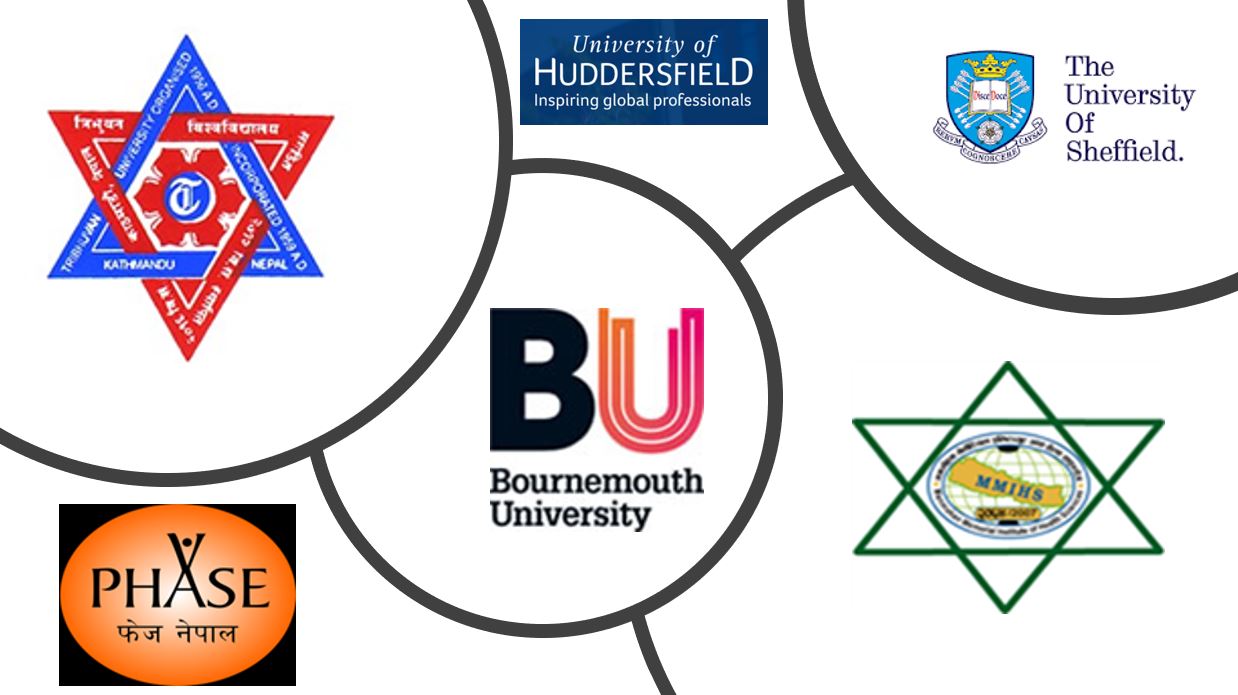
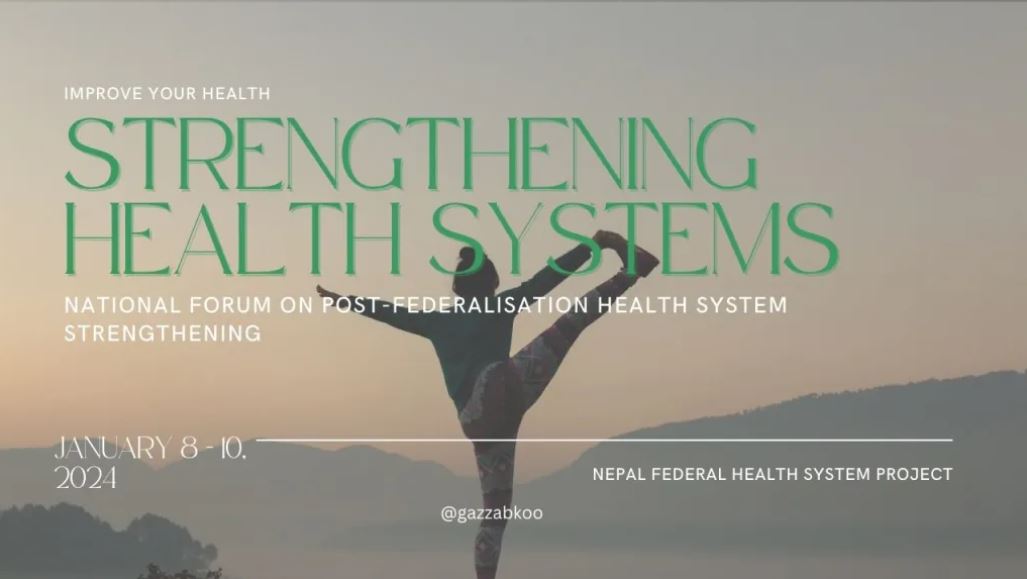 This is one of several news articles from this project which have appeared in both English and Nepali in national media in Nepal.
This is one of several news articles from this project which have appeared in both English and Nepali in national media in Nepal. 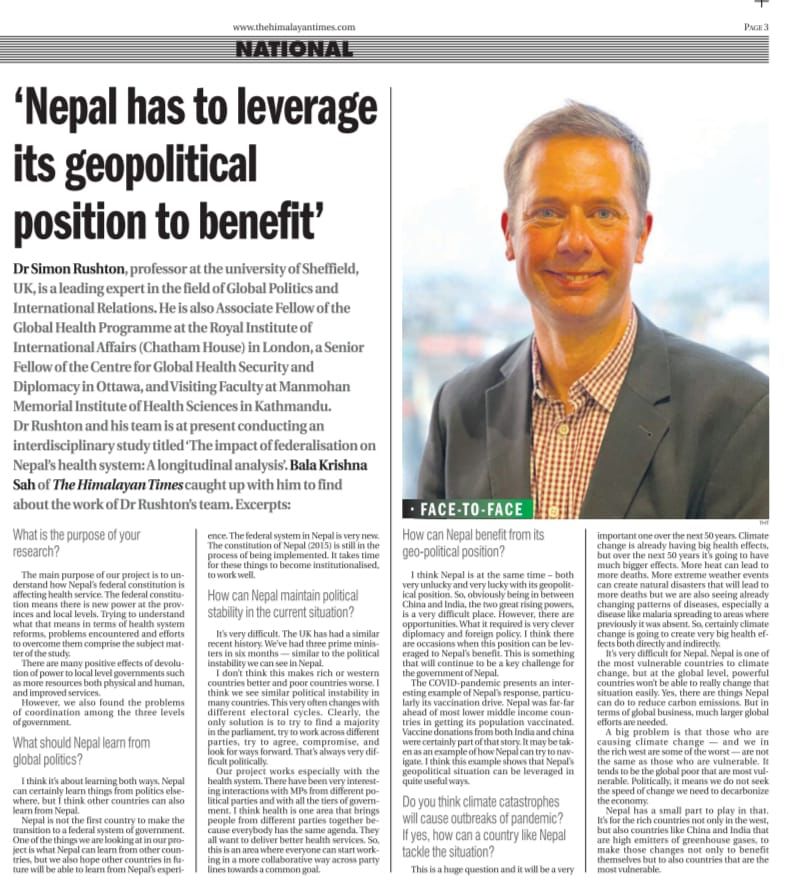 Our interdisciplinary research project ‘
Our interdisciplinary research project ‘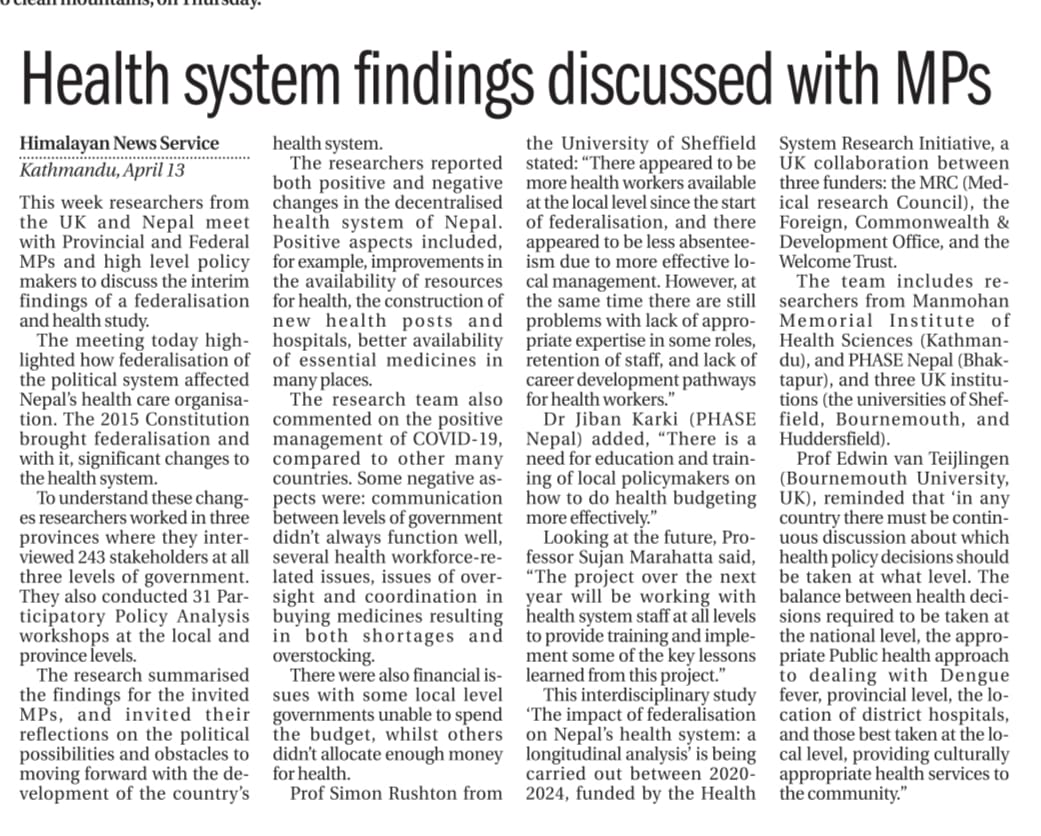
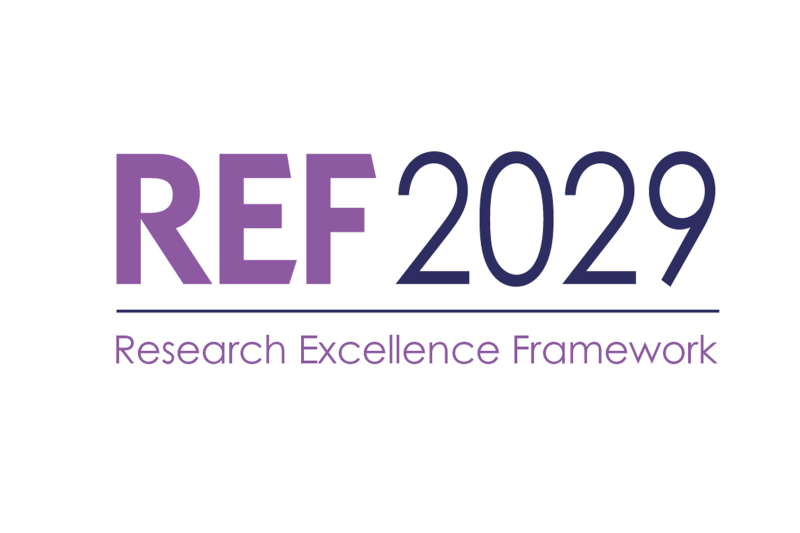












 3C Event: Research Culture, Community & Cookies – Tuesday 13 January 10-11am
3C Event: Research Culture, Community & Cookies – Tuesday 13 January 10-11am Dr. Chloe Casey on Sky News
Dr. Chloe Casey on Sky News Final Bournemouth University publication of 2025
Final Bournemouth University publication of 2025 On Christmas Day in the Morning…
On Christmas Day in the Morning… New Nepal scoping review on maternal & neonatal health
New Nepal scoping review on maternal & neonatal health ECR Funding Open Call: Research Culture & Community Grant – Application Deadline Friday 12 December
ECR Funding Open Call: Research Culture & Community Grant – Application Deadline Friday 12 December MSCA Postdoctoral Fellowships 2025 Call
MSCA Postdoctoral Fellowships 2025 Call ERC Advanced Grant 2025 Webinar
ERC Advanced Grant 2025 Webinar Horizon Europe Work Programme 2025 Published
Horizon Europe Work Programme 2025 Published Update on UKRO services
Update on UKRO services European research project exploring use of ‘virtual twins’ to better manage metabolic associated fatty liver disease
European research project exploring use of ‘virtual twins’ to better manage metabolic associated fatty liver disease